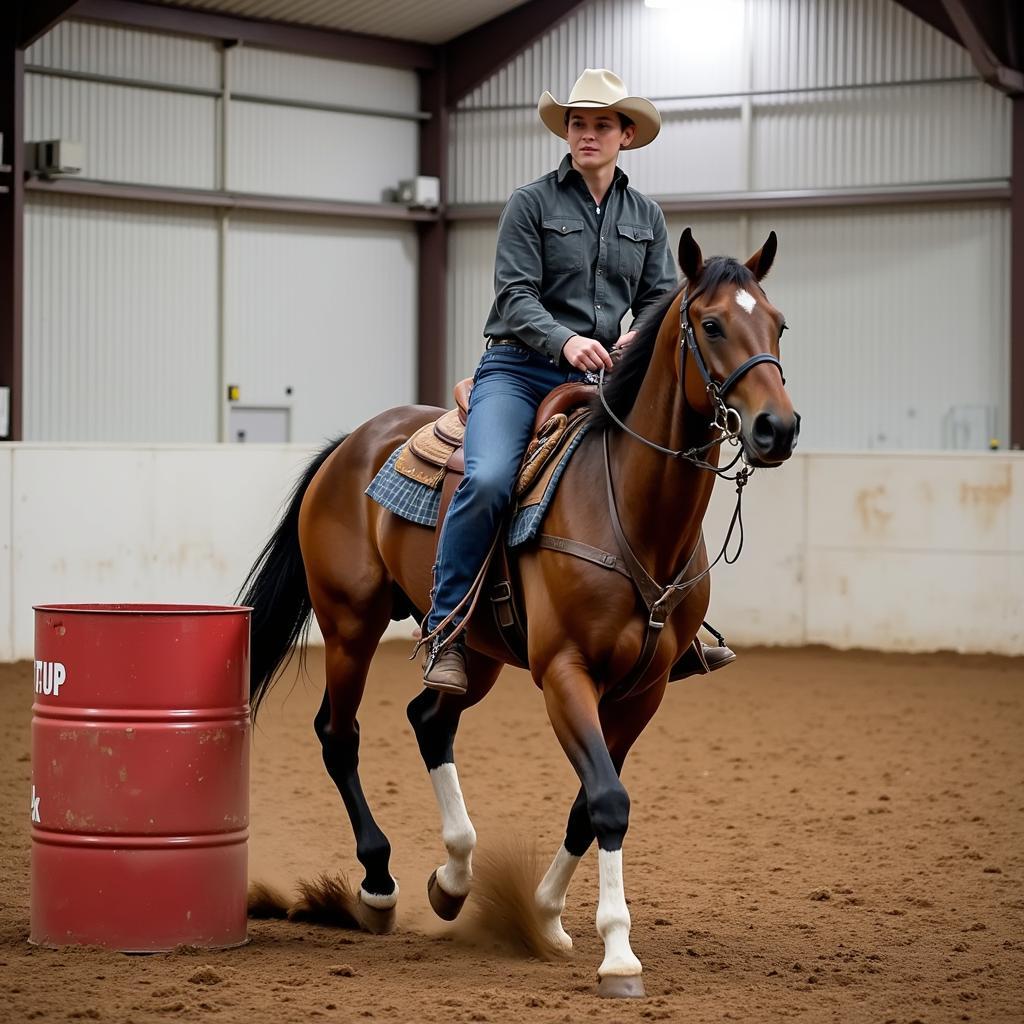Barrel racing demands a unique blend of speed, agility, and a strong partnership between horse and rider. Choosing the right horse breed can significantly impact your success in this thrilling rodeo event. This article explores some of the top Horse Breeds For Barrel Racing, delving into their characteristics, strengths, and what makes them excel in this fast-paced competition.
Finding the perfect barrel racing partner involves understanding the different breeds and their suitability for the sport. While many breeds can be trained for barrel racing, some naturally possess the traits that give them a competitive edge. Let’s take a closer look at the breeds that consistently dominate the arena.
The Reigning Champions: Quarter Horses
Quarter Horses are undeniably the most popular choice for barrel racing. Their powerful hindquarters, compact build, and innate “cow sense” make them incredibly agile and quick. These horses are known for their explosive speed over short distances, a crucial factor in navigating the tight turns of a barrel racing pattern. They are also highly trainable and intelligent, forming strong bonds with their riders.
Why Quarter Horses Excel in Barrel Racing
- Exceptional Speed and Agility: Quarter Horses are built for short bursts of speed and quick turns, perfectly suited for the demands of barrel racing.
- Trainability and Intelligence: Their intelligence and willingness to learn make them highly responsive to training and capable of mastering complex patterns.
- “Cow Sense”: This inherent ability to read and react to cattle movements translates into exceptional maneuverability and anticipation in the barrel racing arena.
Other Notable Breeds
While Quarter Horses reign supreme, other breeds also make excellent barrel racing partners.
Appaloosas: A Splash of Speed and Style
Appaloosas, with their distinctive spotted coats, are known for their speed, stamina, and athleticism. They possess a good combination of speed and agility, making them a solid choice for barrel racing. If you are looking for horses for sale washington, Appaloosas are a good breed to consider.
Paints: Beauty and Brawn in the Arena
Paint Horses, often closely related to Quarter Horses, share many of the same desirable traits for barrel racing. Their stocky build and powerful legs provide the strength and speed necessary for quick turns and bursts of acceleration.
Thoroughbreds: Adding a Touch of Elegance to the Race
Thoroughbreds, renowned for their speed and stamina on the racetrack, can also excel in barrel racing. Their longer strides and leaner build might require some adjustments to the training approach, but their natural speed can be a significant advantage.
Choosing the Right Horse for You
The “best” barrel racing breed depends on the individual rider’s experience, training style, and personal preferences. Factors to consider include:
- Experience Level: For beginners, a well-trained Quarter Horse or Paint Horse might be a good starting point. More experienced riders might explore the athleticism of an Appaloosa or Thoroughbred.
- Training Style: Different breeds respond to various training methods, so finding a horse that suits your training style is essential.
- Personal Preferences: Ultimately, the best horse for you is the one you connect with and feel confident riding.
If you are looking for horses for sale riverside, consider what breed best suits your needs.
What are the best horse breeds for beginners in barrel racing?
Quarter Horses and Paint Horses are generally considered good choices for beginners due to their trainability and temperament.
How important is the horse’s bloodline in barrel racing?
While bloodline can influence a horse’s potential, training and the rider’s skill are equally important factors in achieving success. Many excellent barrel racers come from less prominent lineages. Those looking for more information on different horses can look at our article on types of riding horses.
 Barrel Racing Training
Barrel Racing Training
Conclusion
Selecting the right horse breed for barrel racing is crucial for success in this exciting sport. While Quarter Horses remain a popular and effective choice, other breeds like Appaloosas, Paints, and Thoroughbreds can also excel in the arena. Consider your experience level, training style, and personal preferences when choosing your barrel racing partner. With the right horse and dedicated training, you’ll be well on your way to conquering those barrels. If you’re looking for horses for sale bakersfield, remember the key factors we’ve discussed.
FAQ
- What is the average cost of a barrel racing horse?
- What equipment is needed for barrel racing?
- How often should a barrel racing horse be trained?
- What are some common barrel racing injuries in horses?
- How do I find a qualified barrel racing trainer?
- Are there specific barrel racing competitions for different breeds?
- What is the best age to start training a horse for barrel racing?
For those interested in connecting with fellow horse enthusiasts, you might find our article on horse communities in north carolina helpful.
When you need assistance, please contact us at Phone Number: 0772127271, Email: [email protected] or visit us at QGM2+WX2, Vị Trung, Vị Thuỷ, Hậu Giang, Vietnam. We have a 24/7 customer support team.